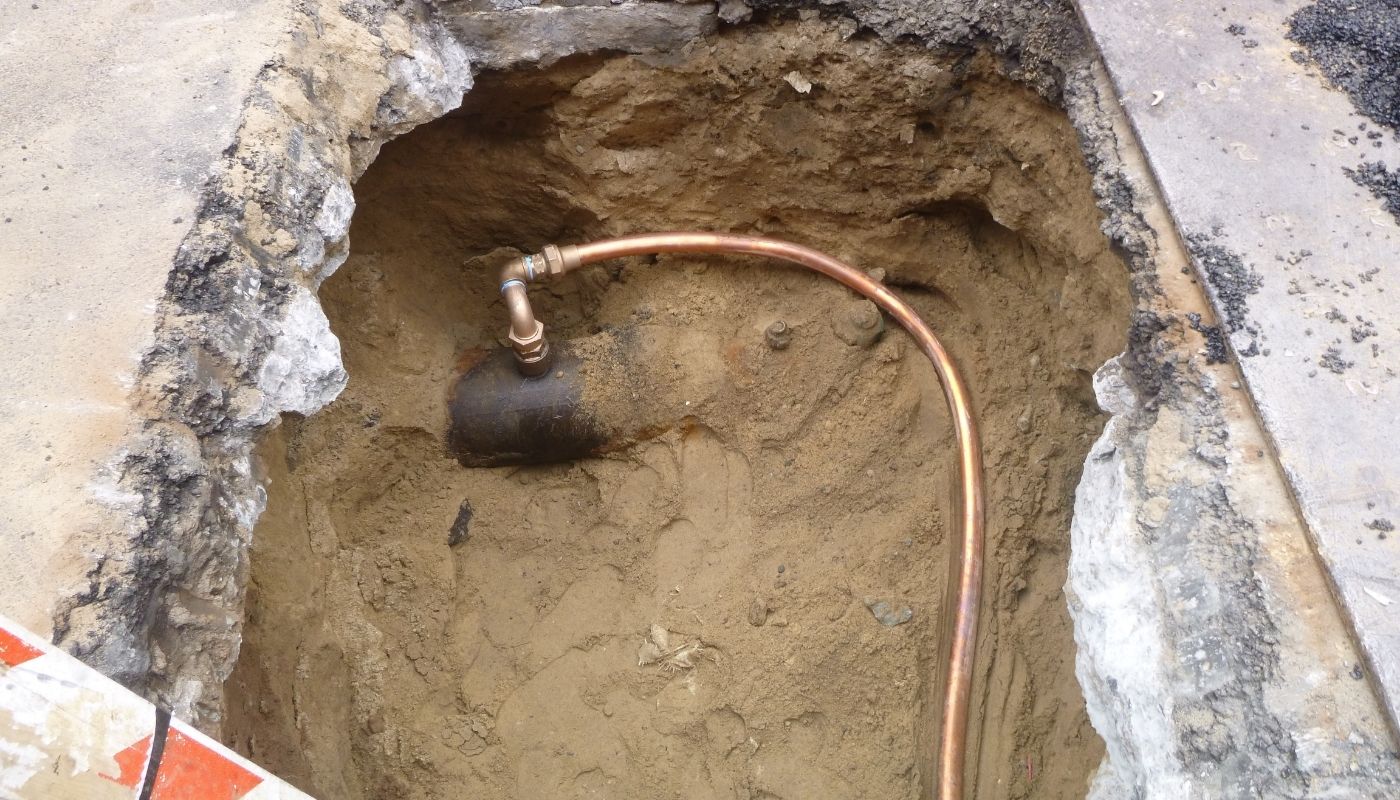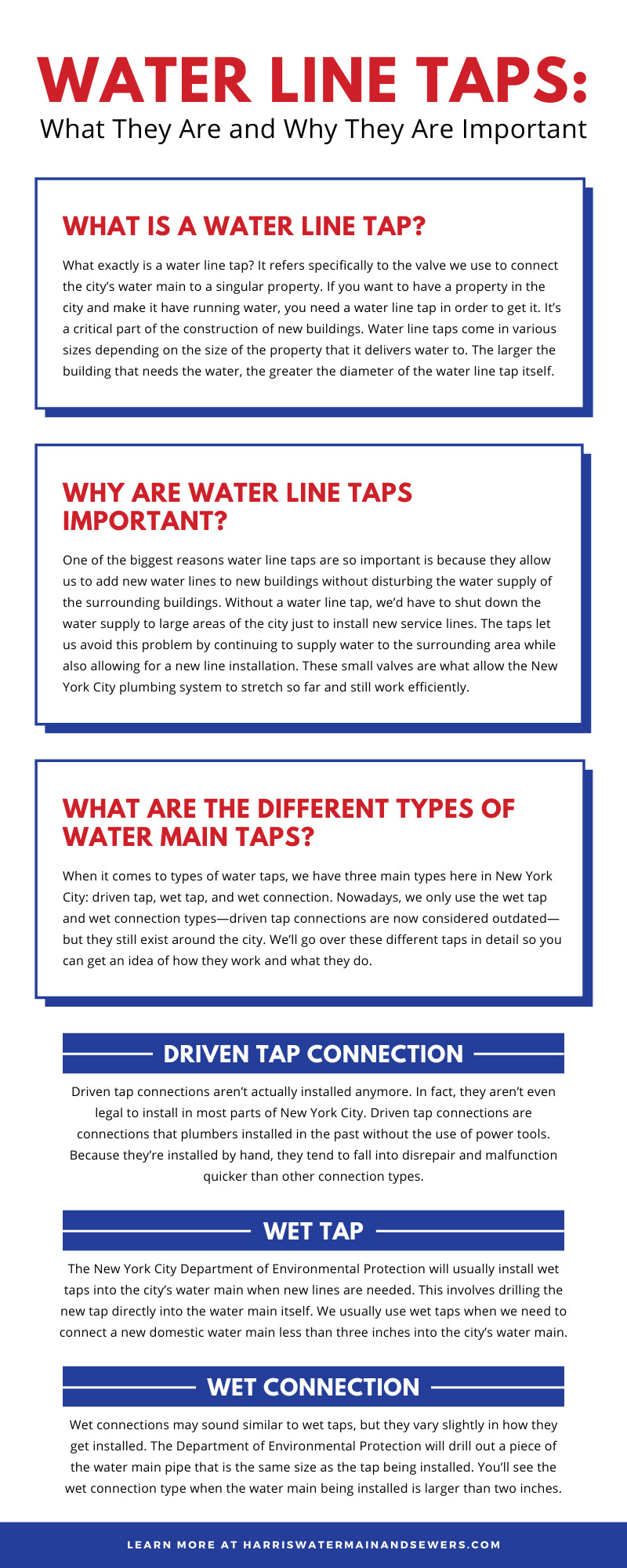The world of plumbing installation and maintenance in New York City can seem indecipherable when you first start to learn about it. As New York has, arguably, the most complex and in-depth plumbing system anywhere in the country, many people don’t give it a second thought—until it becomes something they can’t ignore. If you plan on constructing a new house or building, you need to get running water to it as soon as possible. This is where a lot of people get confused as to how this works.
In order to obtain running water in a new home or building, that building must have a water line tap. In this article, we’re going to go over what water line taps are and why they are important. After reading this, you’ll have a better idea of how plumbing in general works, as well as how we do things specifically here in New York City.
What Is a Water Line Tap?
What exactly is a water line tap? It refers specifically to the valve we use to connect the city’s water main to a singular property. If you want to have a property in the city and make it have running water, you need a water line tap in order to get it. It’s a critical part of the construction of new buildings. Water line taps come in various sizes depending on the size of the property that it delivers water to. The larger the building that needs the water, the greater the diameter of the water line tap itself.
Why Are Water Line Taps Important?
One of the biggest reasons water line taps are so important is because they allow us to add new water lines to new buildings without disturbing the water supply of the surrounding buildings. Without a water line tap, we’d have to shut down the water supply to large areas of the city just to install new service lines. The taps let us avoid this problem by continuing to supply water to the surrounding area while also allowing for a new line installation. These small valves are what allow the New York City plumbing system to stretch so far and still work efficiently.
What Are the Different Types of Water Main Taps?
When it comes to types of water taps, we have three main types here in New York City: driven tap, wet tap, and wet connection. Nowadays, we only use the wet tap and wet connection types—driven tap connections are now considered outdated—but they still exist around the city. We’ll go over these different taps in detail so you can get an idea of how they work and what they do.
Driven Tap Connection
As we said, driven tap connections aren’t actually installed anymore. In fact, they aren’t even legal to install in most parts of New York City. Driven tap connections are connections that plumbers installed in the past without the use of power tools. Because they’re installed by hand, they tend to fall into disrepair and malfunction quicker than other connection types. They also clog much more often than modern connections. When we find them, we replace driven taps more often than not because modern water taps are a much better alternative.
Wet Tap
The New York City Department of Environmental Protection will usually install wet taps into the city’s water main when new lines are needed. This involves drilling the new tap directly into the water main itself. We usually use wet taps when we need to connect a new domestic water main less than three inches into the city’s water main. This is one of the more common types of taps; you can find wet taps all over New York City, providing water to a variety of different building types and sizes.
Wet Connection
Wet connections may sound similar to wet taps, but they vary slightly in how they get installed. The Department of Environmental Protection will drill out a piece of the water main pipe that is the same size as the tap being installed. You’ll see the wet connection type when the water main being installed is larger than two inches.
When Are New Taps Installed?
Now that we have a better idea of what water line taps are, we can start to think about the reasons a property owner would need to have one installed. There are more reasons than just constructing a new building. Old taps also need replacements after a long enough time, or if they used an outdated installation method.
New Building Installations
As we’ve mentioned, usually new water taps get installed when new buildings or houses get built. You’ll need a licensed New York City Plumber, such as the ones here at Harris Main and Water Sewer Contractors, to help facilitate the Department of Environmental Protection in installing the tap and new water line.
Leaking Tap Connection
Water taps should last a long time. However, if yours start to leak, it can cause a huge issue for your building and the surrounding area. We install new taps when the old ones begin to leak, usually because they are old or the shifting ground damaged them in some way.
Outdated Taps
If your tap leaks and you discover you have an outdated driven tap connection, replace that connection with a more modern tap. Like we stated above, driven tap connections aren’t as reliable as the wet taps or wet connections we install nowadays.
Updating Size or Materials
You’ll need a new water tap if you want to increase its size, which you might need if you expand the building the line connects to. If your line is made of lead rather than copper, as most new plumbing is made of, you might also need a new tap.
Low Water Pressure Issues
Issues involving low water pressure can have a variety of sources, but if you find that nothing you do fixes the problem, it could be that your tap needs a replacement.
Now that you have a little more information on what water line taps are and why they’re important, you can better appreciate the work that goes into making sure New York City has the running water it needs. If you’re in need of water main repair in Brooklyn, NY, Harris Main and Water Sewer Contractors is the place to go for help.






















